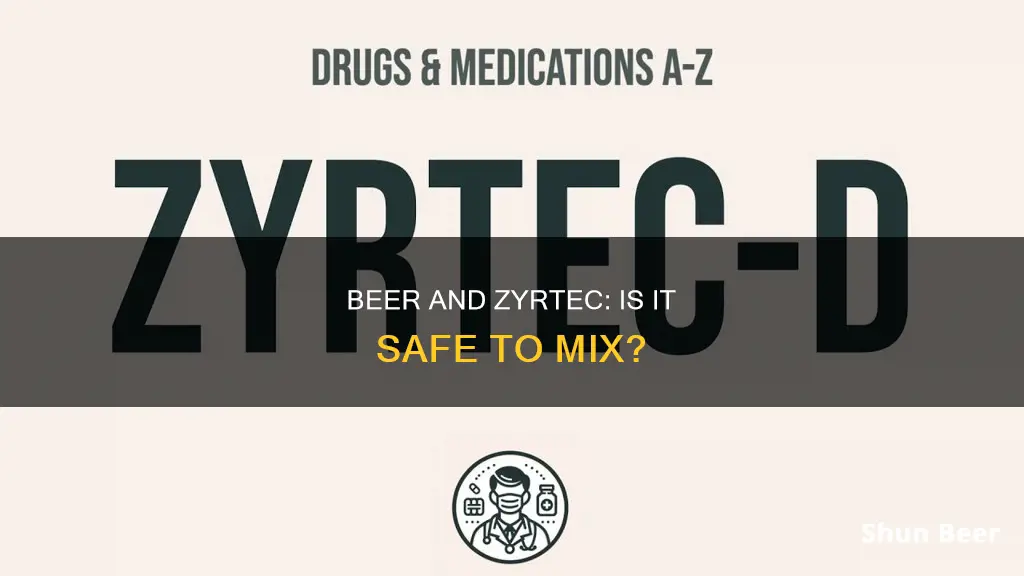
Zyrtec, also known by its generic name, cetirizine, is a second-generation antihistamine used to treat allergy symptoms. While it is not expected to cause serious health problems, patients taking this over-the-counter medication are generally advised to avoid alcohol. This is because Zyrtec may impair mental function, memory, and thinking capabilities, and alter the patient's reaction time to different stimuli. Alcohol can produce similar effects, and combining the two substances can lead to increased central nervous system depression, resulting in excessive sedation and impaired judgment, thinking, and psychomotor skills. This combination may also cause dangerous side effects, such as excessive drowsiness, and increase the risk of accidents, especially for those driving or operating machinery.
| Characteristics | Values |
|---|---|
| Zyrtec | A second-generation antihistamine used to treat allergy symptoms |
| Alcohol | A central nervous system depressant |
| Zyrtec and Alcohol Interaction | Increased central nervous system depression, resulting in excess sedation |
| Impaired judgment, thinking, and psychomotor skills | |
| Excessive drowsiness | |
| Increased risk of accidents, especially when driving or operating machinery | |
| Increased risk of falls and injuries for elderly patients | |
| Recommendations | Avoid consuming alcohol while taking Zyrtec |
| If consuming alcohol, drink in moderation and avoid activities requiring attention and concentration | |
| Do not drink alcohol right after taking Zyrtec | |
| Discuss alcohol consumption with your healthcare provider if taking Zyrtec under medical supervision |
What You'll Learn

Zyrtec and alcohol may cause dangerous side effects
Zyrtec, also known by its generic name, cetirizine, is a second-generation antihistamine used to treat allergy symptoms such as itching, sneezing, a runny nose, and watery eyes. It is available in both oral and injection form.
Although combining Zyrtec and alcohol is not expected to cause serious health problems, patients taking this over-the-counter antihistamine are generally advised to avoid consuming alcoholic beverages. This is because Zyrtec may impair mental function, memory, and thinking capabilities, and alter the patient's reaction time to different stimuli. Alcohol can produce the same effects, so taking it with Zyrtec can lead to more impairment of the user's mental function, resulting in potentially dangerous side effects, particularly excessive drowsiness and sedation. This can cause accidents, especially for people driving or operating machinery.
Older adults are also at an increased risk of falls and possible serious injuries due to reduced mental function. Therefore, people taking Zyrtec should be advised to avoid alcohol. If you decide to consume alcohol, make sure that you do so in moderation and do not drink a large amount at once, especially if you do not know the specific effects of the drug on you. Furthermore, do not engage in activities that require attention, focus, and concentration, such as driving or operating heavy machinery. It may not be safe for you to consume your usual alcohol dose, so consider limiting your intake. As much as possible, do not drink alcohol right after taking Zyrtec. If you are taking Zyrtec under medical supervision, be sure to discuss your alcohol consumption with your healthcare provider.
Beer Trading: How Does It Work?
You may want to see also

Zyrtec and alcohol may lead to impaired judgment
Zyrtec, also known by its generic name cetirizine, is an antihistamine used to treat allergy symptoms. It is available over the counter and is generally safe for use. However, it is important to be aware of potential risks and side effects when taking any medication, especially when combined with other substances like alcohol.
While taking Zyrtec, it is typically advised to avoid the consumption of alcohol. Although combining Zyrtec and alcohol is not expected to cause severe health issues, the interaction between the two substances can lead to increased central nervous system depression, resulting in excessive sedation. This can impair your judgment, thinking, and psychomotor skills.
Zyrtec itself may impair mental function, memory, and thinking capabilities. It can also impact your reaction time to various stimuli. Alcohol has similar effects and combining it with Zyrtec may lead to further impairment of your mental function. This can result in dangerous side effects, particularly excessive drowsiness and sedation. These effects can increase the risk of accidents, especially when driving or operating machinery.
Older adults are at a higher risk of experiencing falls and injuries due to reduced mental function when combining Zyrtec and alcohol. Therefore, it is generally recommended that individuals taking Zyrtec avoid consuming alcohol or do so in moderation. If you choose to consume alcohol while taking Zyrtec, it is important to refrain from activities that require attention, focus, and concentration, such as driving or operating heavy machinery.
Beer and Vinegar: A Safe Mix?
You may want to see also

Zyrtec and alcohol may cause psychomotor impairment
Increased Sedation and Impairment:
Combining Zyrtec and alcohol can lead to heightened sedation and impairment. Zyrtec is an antihistamine that may cause drowsiness in some individuals. When mixed with alcohol, a central nervous system depressant, the drowsiness effect can be intensified. This increased sedation can result in excessive sleepiness, making it unsafe to engage in activities that require alertness, such as driving or operating machinery.
Enhanced Dizziness and Loss of Coordination:
Both Zyrtec and alcohol can cause dizziness and impair coordination. Consuming them together can magnify these effects, increasing the risk of accidents and injuries. The combination may lead to balance issues and a higher risk of falling or engaging in risky behaviours.
Adverse Reactions and Interactions:
Alcohol can interfere with the metabolism and absorption of medications like Zyrtec, affecting their efficacy and causing adverse reactions. It can amplify the side effects of Zyrtec, including drowsiness, fatigue, dry mouth, dizziness, and impaired coordination and judgment. This combination may also result in blurred vision, headaches, low blood pressure, nausea, vomiting, and heart palpitations.
Liver Metabolism and Health:
Both Zyrtec and alcohol are metabolised by the liver. Excessive intake of alcohol while taking Zyrtec may decrease the liver's ability to process them effectively, as they compete for breakdown by the liver. This can lead to potential liver damage and strain on the organ.
Warnings and Precautions:
It is generally advised to avoid or limit alcohol consumption when taking Zyrtec. Consult with a healthcare professional for specific guidelines and always follow the recommended dosage. Be cautious if you need to perform activities that require alertness, as the combination may impair your cognitive function and increase the risk of accidents. If you experience any unusual side effects or heightened drowsiness, refrain from consuming alcohol while taking Zyrtec.
A Beer Kegerator's Working: Understanding the Basics
You may want to see also

Zyrtec and alcohol may increase CNS depression
Zyrtec, also known as cetirizine, is an antihistamine used to treat allergy symptoms. It is generally considered safe to consume alcohol while taking Zyrtec, as long as it is done in moderation. However, it is important to understand the potential risks and side effects of mixing these two substances.
Both Zyrtec and alcohol can cause drowsiness and impair cognitive function. When combined, these effects may be intensified, leading to excessive sleepiness, dizziness, and impaired motor skills. This can pose a significant risk to your safety, especially when engaging in activities that require alertness, such as driving or operating machinery.
The combination of Zyrtec and alcohol can also affect your central nervous system. Alcohol can increase the nervous system side effects of Zyrtec, such as dizziness, drowsiness, and difficulty concentrating. In some cases, individuals may experience impairment in thinking and judgment. Therefore, it is recommended to avoid or limit alcohol consumption while being treated with Zyrtec.
It is important to follow the recommended dosage of Zyrtec and to consult with a healthcare professional if you have any questions or concerns. The impact of mixing Zyrtec and alcohol can vary depending on individual factors such as body weight, metabolism, and overall health. Additionally, the timing and dosage of both substances also play a crucial role in minimizing potential interactions and adverse effects.
To ensure your safety and well-being, it is always advisable to exercise caution and consult with a healthcare professional before mixing Zyrtec and alcohol. They can provide personalized guidance based on your specific circumstances and medical history.
Tooth Extraction: Beer Drinking and Recovery Time
You may want to see also

Zyrtec and alcohol may cause excessive sedation
Zyrtec, also known by its generic name cetirizine, is a second-generation antihistamine used to treat allergy symptoms such as itching, sneezing, a runny nose, and watery eyes. It is available in both oral and injection form.
Although combining Zyrtec and alcohol is not expected to cause serious health problems, patients taking this over-the-counter antihistamine are generally advised to avoid consuming alcoholic beverages. This is because Zyrtec may impair mental function, memory, and thinking capabilities. It can also alter the patient's reaction time to various stimuli, and since alcohol can produce the same effects, taking it with Zyrtec can lead to more impairment on the user's mental function.
This combination may result in excessive sedation, impaired judgment, and reduced psychomotor skills. It can cause accidents, especially for people who are driving or operating machinery. Older adults are also at an increased risk of falls and possible serious injuries due to reduced mental function.
Therefore, it is recommended that patients taking Zyrtec avoid alcohol or consume it in moderation. They should not drink a large amount at once, especially if they do not know the specific effects of the drug on them. It is also advised not to drink alcohol right after taking Zyrtec. If you are taking Zyrtec under medical supervision, be sure to discuss your alcohol consumption with your healthcare provider.
Drinking Beer in Your Car: Pennsylvania's Laws
You may want to see also







